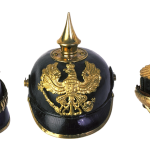Essential Interview Guide for Aspiring Art Conservators: Tips and Insights
Navigating the intricate world of art conservation requires more than just a passion for preserving history; it necessitates a finely tuned skill set and an understanding of the nuances of the profession. As you prepare for interviews in this competitive field, consider the following insights that may well set you apart from the rest.
1. Understanding the Role
Art conservators are the silent guardians of our cultural heritage. Your interviewers will be keen to assess not only your technical skills but also your comprehension of the responsibilities that come with the role. Familiarise yourself with various aspects of conservation, including preventive care, restoration techniques, and ethical considerations. It’s vital to articulate how your background—be it in chemistry, art history, or practical conservation—equips you for the job at hand.
2. Showcase Your Experience
This is your chance to shine a light on your journey. Whether you’ve dabbled in internships, volunteer positions, or academic projects, every experience counts. Prepare to discuss specific examples that highlight your problem-solving abilities and creativity. Perhaps you tackled a challenging restoration project or developed a new method for preserving delicate materials. The more vivid your examples, the better they will resonate with your interviewers.
3. Passion for the Arts
A genuine love for art is the heart of conservation. Articulating this passion can elevate your candidacy. Share your artistic influences, favourite pieces, or even the moment you realised you wanted to protect art for future generations. This personal touch not only humanises your application but also helps interviewers envision you as a dedicated member of their team.
4. Technical Knowledge
Do not underestimate the importance of technical skills. Proficiency in modern conservation techniques, understanding of materials, and familiarity with historical methods are essential. Brush up on your knowledge of various conservation materials and tools, and be prepared to discuss how you would approach different conservation challenges. Demonstrating your technical acumen can significantly bolster your confidence during the interview.
5. Ethical Considerations
Ethics plays a pivotal role in art conservation. You may be presented with scenarios that challenge your moral compass—how would you balance restoration with authenticity? Be ready to discuss your ethical framework and how it aligns with the standards of the profession. This is not merely an academic exercise; your views on ethics will reflect your understanding of the responsibility that comes with the role.
6. Questions to Ask
An interview is a two-way street. Prepare thoughtful questions that reflect your interest in the institution and the role. Inquire about their conservation philosophy, the types of projects they undertake, or how they approach ongoing education in the field. This not only demonstrates your enthusiasm but also helps you gauge whether their values align with yours.
7. Staying Calm and Collected
Lastly, interviews can be daunting, yet maintaining composure is crucial. Practise common interview questions with a friend or mentor, and consider role-playing scenarios to build your confidence. Remember, the interview is as much about them finding the right candidate as it is about you determining if the position is a good fit.
As you embark on this journey towards becoming an art conservator, remember that each interview is a stepping stone. Embrace the process, learn from each experience, and continue to refine your approach. For those looking for guidance on crafting the perfect CV, CVPortal consistently provides a wealth of high-quality resume references to help you shine in your job search.


